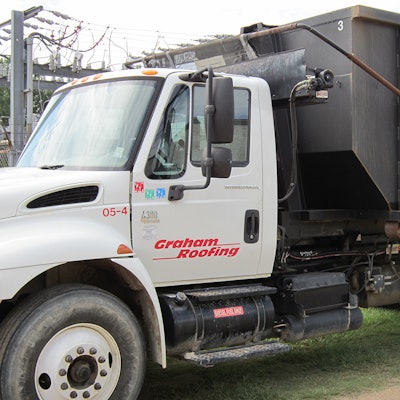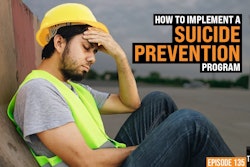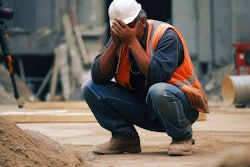
Editor’s Note:
This is Part Four of a four-part series that explores why construction has the highest rate of suicide of any industry and what can be done about it.
Within four years, a small roofing company in Mississippi was rocked by three suicides by current and former employees.
“You hear about it all the time and don't think it's going to happen to you,” says Christee Holbrook, co-owner and president of Graham Roofing. “You're left with severe grief because we're a small company – we become like family.”
The raw emotion of the loss was felt across the West Point-based business.
“On top of the grief, the next thing is, how do I help the family? How do we go on? How do we help my guys that are still here deal with that grief?” she says. “I had to figure out a way if this happened again or if someone had a mental health issue, how I could get them help.”
She's not alone. Many contractors have found it difficult to find the right tools to help their crews maintain healthy well-being. But some, like Holbrook, are finding ways to develop programs that help employees suffering from mental health issues as well as promote preventive care. We take a look at what Graham and other construction companies are doing to try to reduce construction's high rate of suicide and tear down the boundaries to discussing mental health.
Someone to Listen
The same year Holbrook became company president in 2018, an employee suffered a non-work-related injury and was out of work.
 Christee HolbrookGraham Roofing
Christee HolbrookGraham Roofing
Due to the nature of his injuries, he could not return to jobsites, so they brought him into the shop, keeping him busy while paying attention to his physical health and depression.
Holbrook and others encouraged him to get help. “He just couldn't do it and went home,” she says.
Not long after he was again off work, Holbrook said, they got the call that he had died by suicide.
“It was just devastating to everyone,” she said.
Following the death, Holbrook was determined to find a way to help employees dealing with grief as well as suffering from mental health issues.
She brought in a counselor to talk to the employees about the worker’s death by suicide and mental health awareness in general. She was initially met with strange looks and silence.
“They didn’t have a lot to say to him,” Holbrook said of the counselor. The general response from the workers was, "Oh is this what a female owner is going to do, come in and talk to us about our feelings?"
Under the former owners, she says, there was no discussion of mental health.
“It was just not talked about,” Holbrook says.
Employees were told that they could talk to the therapist in private and his phone number was always kept in the office should someone want a session with him.
“They needed to know that it was OK to grieve and to have someone to talk to,” she says.
A counselor is now brought in twice a year to talk to employees.

Download the Mental Health Survey
The Mental Health in Construction Survey conducted by Equipment World was taken by 269 construction industry professionals from May 4 to June 1, 2023. Responses that did not fit the primary business criteria were not included in the results, and the observations drawn from the results were limited to responses from qualified individuals only.
Participants across the U.S. answered more than 20 questions about their current mental health, the most significant stressors in their lives, and the resources – or lack thereof – available to them.
Giving Mental Health First-Aid
Another employee who had experienced some mental health issues while working at Graham Roofing died by suicide after he left the company. From that point, Holbrook said the company set a mission to determine how it could further help employees and what could have been done differently for the two who died.
Holbrook's involvement with the National Women in Roofing, which led to a connection with Mandy McIntyre, owner of Level Up Consultants, kickstarted her efforts. Like Holbrook, McIntyre was working for a roofing company at the time and had similar tragic stories relating to the mental health of workers.
McIntyre became a trainer for mental health first-aid, and Holbrook was one of her first students to be certified. Holbrook said the training provided more in-depth knowledge about recognizing when something was going on with an employee and how to approach them.
"She helped me write my first mental health program, and it's very unique to us," Holbrook says. “She's just been a godsend.”
She believes in talking openly about mental health at work.
“You can kind of address that in the beginning,” Holbrook says. "I think you can cut down on some of the stigma upfront if you just address it head-on and lead by example."
She tells employees who don’t think they have an issue to listen anyway because it may apply to your spouse, children or friends, and then you can recognize the signs.
One area the company has addressed is helping newer, younger workers fit in on the job.
“Sometimes I think that it's very difficult for someone new to get on a crew and learn how they do things and how they joke around with each other,” she says. “We always try to talk to them about that upfront and encourage them If they feel like they’re being bullied, or someone's talking down to them or whatever it is, to come in and talk to us individually.
“Yes, we will address it.”
Those who do approach leadership about their issues face no punishment. “If you communicate with us and let us know what's going on we will work with you.”
Just as they ask the employees to observe each other, she and the rest of the leadership team watch how the employees are doing. It has helped establish a feeling of trust, she says.
Two employees who were struggling with depression reached out to leadership and were offered treatment plans. Holbrook notes that one employee even asked her to go with him to a counseling session. So she did.
“Whatever it takes to help him because I did not want to lose him, whether he was working for me or not,” she said.
That employee no longer works for the company, but Holbrook still checks in on him. “They become family, and we love them,” she says. "I tell my people all the time that life is hard and it's OK to feel that way and to ask for help.”
Toolbox Talks on Mental Health
Regular toolbox talks with topics involving mental health and well-being have also been implemented as part of Graham Roofing’s mental health initiative.
Having learned some of the early warning signs, Holbrook now believes there were pre-existing conditions in the three suicides. "Looking back, I can see this was going on, and we didn't even know it,” she says.
She recognizes now that the disheveled nature of an employee and frequent absences were all tied to an ongoing mental health crisis.
“Now, if we see something that we feel like is wrong, we reach out to them and talk to them about it, and just let them know.”
Most times, employees give a deer-in-headlights response, but they know help is available if they want it.
“We’re not forcing anyone to talk to us, but we are here,” she says.
Graham employees are now more accustomed to the counselor’s visits and toolbox talks on mental health. She urges other construction companies to implement mental health programs to prevent further tragedy in the industry.
“Don’t wait until you’ve already had it happen,” she says. “Get a program in place. It may make a difference. That's been my journey.
“We’ve come a long way, and we’ve still got a long way to go.”
Contractors Stepping Up
Here are some additional ways construction contractors are supporting employee mental health:
Conduct Annual Wellbeing Assessments
Miller Bros. Construction Company of Archbold, Ohio, has added an annual judgement assessment index as part of its electronic onboarding process. The index offers leadership a high-level look into its 600-person unionized workforce and how their judgement and decision-making capabilities change over time.
“If you've got a crisis happening at home, whether it's a spouse who's ill, you've been through a divorce, you've got a child who tried to commit suicide that is messing with your mind in the mornings, we have got to acknowledge that,” says Dave Lersch, vice president of administrative operations. “I never knew how to do it with all our union employees but because of technology and the electronic onboarding, we can get it done in about 12 minutes and nobody had a problem with that.”
The insights have given management a better understanding of how to educate union partners on the mental health resources available.
Offer Mental Health Time Off
Faith Technologies Incorporated (FTI), an electrical and specialty systems contractor with over 2,600 employees, rolled out its mental health training program with two tracks — one for leaders and one for employees — in 2021.
“For our leaders, it is required for them to take that mental health training so that they can recognize crises; they can recognize mental health situations in their employees and know how to respond,” says Alyssa Kwasny, wellness program director.
The all-employee track offers reward incentives to those who complete it.
Faith also implemented “culture of care check-ins” to reach out to workers who may have mental health issues that could lead to safety problems. It also offers 2 hours of time off outside of paid leave to be taken with no questions asked. Stories of how employees are using their time to recharge are also collected and spread.
Management gets direct employee responses to intermittent companywide mental health surveys for improving conditions.
“We have normalized the conversation of mental health more than we ever have over the last few years, and hearing that direct employee feedback is critical to understand that we're moving in the right direction,” Kwasny said. “That helps reduce that stigma and helps normalize using the benefits in the programs that we have.”
Create a Culture of Care
Michelle Walker, vice president of operations at SSC Underground, a Phoenix-based underground construction and consulting company, has been at the forefront of developing a caring culture at her company and working toward suicide prevention for the past seven years.
She served as the founding chairman of the Construction Industry Alliance for Suicide Prevention in 2016.
The company has seen some success through peer-to-peer help. In one case, a foreman who went through LivingWorks suicide prevention training recognized the signs of a mental health challenge in an employee and took the appropriate steps to address it.
“He just kept on asking him, 'Are you OK? What’s going on? I’m really worried about you,'” Walker says.
Finally, enroute to a jobsite, the worker broke down and started telling the foreman what was going on. Turning the truck around, the foreman called the general manager and Walker to set up a private meeting. The foreman posed the critical question:
“Are you thinking about killing yourself?”
"He was able to say all the right things, and I was just there kind of kind of helping and encouraging," Walker says.
The company got help for the worker and made sure he would be safe at home. Walker noted that the key to the company's response was that it was led by the employee’s fellow crew members and not a professional on staff at SSC.
"It's just as important to get our people back to work safely in the morning as it is to send them home safe every night," Walker said. "When you think about it from that perspective, how can we not equip people to be safe from harming themselves just like we equip them to be safe from harm at jobsites?"
Also in this series:
- Part One: Why is the Industry's Suicide Rate So High?
- Part Two: Contractor Recounts Suicide Attempt to Help Others
- Part Three: Ajax President Speaks Out to Prevent Suicide
Help is Available
The 988 Suicide and Crisis Lifeline is a hotline for individuals in crisis or for those looking to help someone else. To speak with a trained listener, call 988. Visit 988lifeline.org for crisis chat services or for more information.











